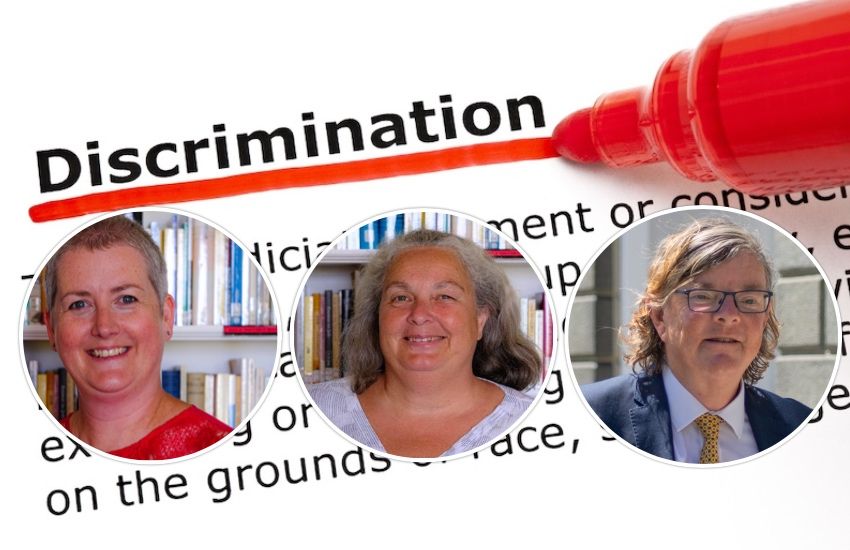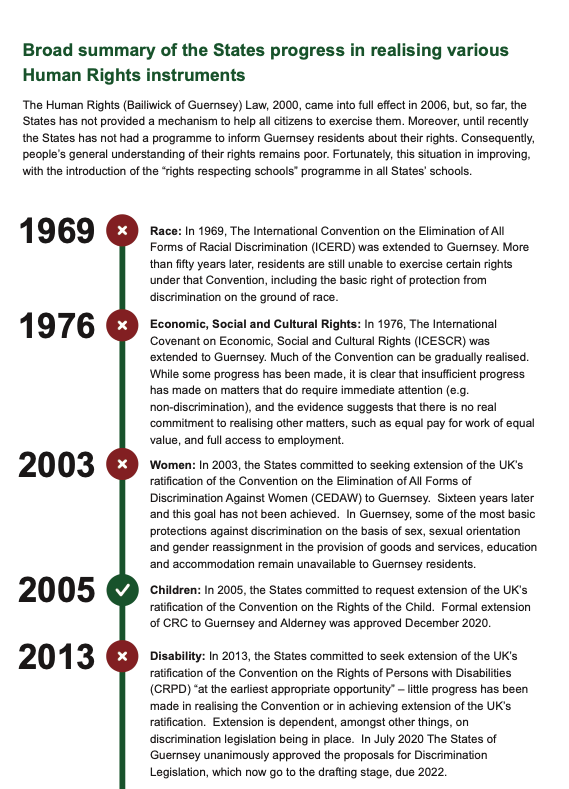


A series of local stakeholders are celebrating the long-awaited publishing of Guernsey’s first comprehensive anti-discrimination legislation, but one think tank is maintaining that parts of the proposals go too far.
Carol Le Page, Social Policy Director at Guernsey Disability Alliance (GDA), told Express that they are delighted that the law is set to go before the States on September 28 after years of lobbying.
“It’s fantastic, we’re really pleased it's out and it's coming… having gone through 15-years of negotiations over this,” she said.
Karen Blanchford, Partnership Director of the GDA and founder of Equality Guernsey, also hailed the publication.
“This is fantastic not just for those with disabilities, but also carer status, religious belief, sexual orientation, and race - which has been waiting the longest,” she said.
The International Convention on the Elimination of all Forms of Racial Discrimination was extended to Guernsey in 1969. 53-years later, racial discrimination is still not legally prohibited.
Deputy Charles Parkinson said he will “certainly” vote in favour of the propositions and looks forward “to the future expansion of Guernsey’s anti-discrimination legislation to cover other characteristics which ought to be protected, such as age and gender identity”.
Pictured: Karen Blanchford has worked in the local third sector for many years.
But the Guernsey Policy and Economic Group (GPEG) said that many of their pre-existing concerns with the legislation are still relevant.
“We welcome much of the law, but not the very long and complex employment related content which remains unjustified, bad for the economy, and very badly drafted,” it said.
It even suggested that the law in its current form means that “private individuals could be liable for the discriminatory actions of their window cleaners”.
GPEG reiterated its primary concern around the law’s definition of disability, calling it “manifestly nonsense”, and fearing that it “will drive vexatious claims”.
It added that amendments to the law can only be laid by deputies when it is presented to the States Assembly and said it would welcome “many areas of improvement”.
Both Ms Le Page and Ms Blanchford agreed that most concerns with the legislation are around disability.

Pictured: People gathered on the Royal Court steps in 2020 to celebrate deputies voting to draft comprehensive anti-discrimination legislation.
Ms Le Page said one concern the GDA are aware of are the grounds for compensation.
She said there is some misunderstanding around the injury to feelings award, which compensates for an act of discrimination or harassment against a person that causes hurt.
The maximum penalty proposed under the Guernsey law for these offences is £10,000, which is in line with similar penalties in the UK, according to Ms Le Page.
“We don’t want it to be a windfall, but equally it has to be commensurate with the injury that has happened,” she said.
“There’s a difference between longer- and short-term relationships… whilst there’s a maximum of £10,000, if the relationship is not long lasting or injurious then there will only be a small amount awarded.”
But Ms Le Page noted that “certain people” want the maximum amount of compensation to be different to what has been proposed.

Pictured: A breakdown of local developments concerning human rights legislation. Credit: Equality Guernsey.
Ms Le Page said the GDA “strongly recommends” that any deputies considering laying an amendment to the Ordinance speak with the law officers and other stakeholders before doing so.
She noted that since the proposals are now primary legislation, and not just a policy letter, it is “quite hard to make amendments”.
Nevertheless, they are attempting to “find anyone thinking of laying amendments,” but added it is likely that many deputies are not thinking of the debate until after the first States meeting of the month on September 7 concludes.
Ms Blanchford emphasised that they have been “meeting with deputies and other stakeholders for over a year” regarding the proposals.
“Anyone who is wavering can come and speak to us.”
Deputy Parkinson said that he can only hope that “there will be no attempts to further delay or water down the proposals”.

Pictured: Deputy Charles Parkinson said he will support the law when it is presented to the States.
The GDA is hosting a presentation at Les Cotils on September 6 at 18:30 for its membership, and some of the wider public, to provide a clearer picture of the legislation “rather than in it's plain, legislative form”.
Campaign groups are also inviting the public to ‘celebrate on the steps’ of the Royal Court on the morning prior to the States meeting where the legislation will be voted on.
“We want our States Members to know we are very positive, and to feel as though they are being supported,” said Ms Le Page.
She added that the public can show their support by attending the meeting at Les Cotils, reading resources online and contacting deputies by email or phone.
“Be polite and be strong in your views,” she implored.
Deputy Parkinson added: “This overdue legislation will finally reach the States in September, and I hope it will be supported by all deputies who agree that Guernsey should have human rights legislation comparable with other Western European countries."
Pictured (top): L-R: Karen Blanchford, Carol Le Page, and Deputy Charles Parkinson.
PODCAST: "Guernsey people are not discriminatory people"
States to get final vote this summer on new anti-discrimination law
ESS welcomes business sector support for anti-discrimination legislation
Draft anti-discrimination law published in unusual move
GPEG hopes amendments to law will "fix relatively ludicrous content"
Comments
Comments on this story express the views of the commentator only, not Bailiwick Publishing. We are unable to guarantee the accuracy of any of those comments.